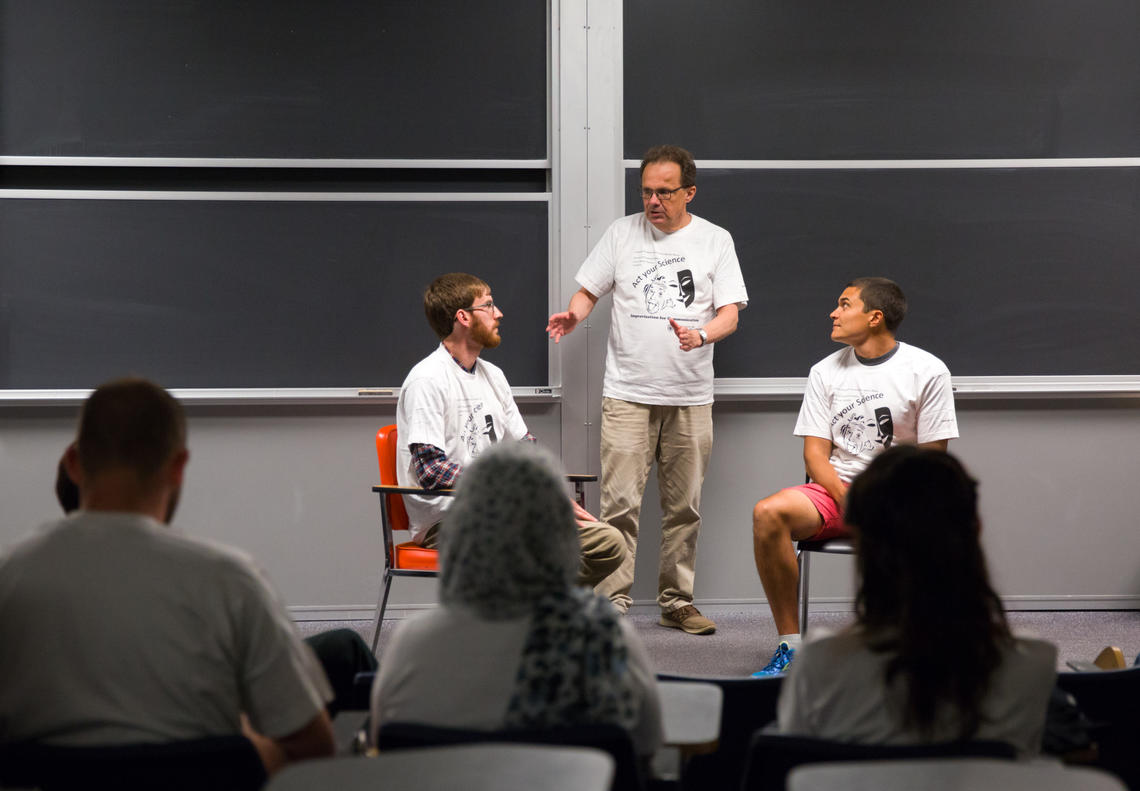Sept. 1, 2017
Science grad students wing it - and learn better communication

Learning how to pass yourself off as a CEO of a major company or as a shy, nervous job seeker through gestures, posture and word choice doesn’t sound like a course designed for science and technology students. But for 30 University of Calgary graduate students, learning these techniques has boosted their confidence and enhanced their public speaking abilities.
Runze Yang is a student in the Neuroscience Graduate Program and a member of the Leaders in Medicine Program at the Cumming School of Medicine (CSM). Yang is good at conveying data and talking in a scientific way but wondered whether his talks were engaging the audience. He signed up for Act your Science and now has a new approach to presentations.
“Through this workshop I’ve learned to trust myself. I just focus on each slide as I’m talking about it — I’m not thinking about the next slide and the next. I’m a better presenter because of it,” says Yang. “I want the audience to be engaged, to feel good about taking the time to listen to my presentation when they have so many other things they could be doing.”
- Pictured above are graduate students learning the theatrical technique of improvisation, that helps them adapt quickly and smoothly to their surroundings when doing presentations. From left: Stacia Leonard, Jennifer Giesbrecht, David Garrett, Shadi Moghaddasi, and Ana Maria Mendoza.
Improvisation is a theatrical technique that trains you to be “in the moment” and adapt quickly and smoothly to whatever is happening around you. Dennis Cahill, the artistic director of the Loose Moose Theatre Company, taught the course. He says failure is bound to happen, “Even if you have a script and have it all written out — what if the computer or projector doesn’t work? How you deal with it informs the audience on how they can feel about it. If you can laugh it off, the audience can relax. If you’re punishing yourself, getting more nervous, the audience will feel nervous, and won’t be concentrating on what you’re saying.”
“The confidence I gained in this class was so much more than I expected. Even my supervisor noticed I was volunteering to do more presentations and group updates,” says Aprami Jaggi, a Geoscience PhD candidate in the Faculty of Science. “I even competed in the three-minute-thesis (3MT) competition at UCalgary and won. I also went on to win the 3MT Western final. I put all the skills I learned in the course to work for me.” Jaggi isn’t the only student to see immediate improvements, Ruth Diaz, MSc’17 and an English as a Second Language student, won the best oral presentation given by a graduate student at the 30th Annual Sebastian K. Littmann Research day.

Dennis Cahill, centre, with students David Garett, left, and Andres Kroker.
Riley Brandt, University of Calgary
Jeff Dunn, a professor in the Department of Radiology at CSM came up with the idea to create the course. “I was always interested in art and drama before science. I went to the Banff Science Communications Program, organized by the founders of Beakerhead. They used improvisation as a teaching tool. After the course, I started thinking that students could really benefit from these techniques.”
The Graduate Students' Association funded two Act your Science courses through their quality money program. Dunn says feedback on the course has been positive and he’s hoping to find funding to make the course a permanent offering. “Students told us they not only learned new skills, but the class left them feeling recharged and ready for another week. One person in the mental health field asked if we could develop this program as a mental health support technique for the graduate program as a whole. That would be great!”
Ready for an improv challenge?
Try this exercise to help you build the skill to listen actively and stay in the moment:
Pay attention to the last letter of the last word a person says to you. When it’s your turn to talk, use that letter as the first letter in the first word of your response.
For example:
Your friend says, “I took a course in mathematics last semester.”
You say, “Really, I was thinking of registering for that one.”
It might look easy here, but just ask any student from the course and they’ll tell you it’s much harder than you think.
Jeff Dunn also has adjunct positions in the departments of Clinical Neurosciences, Physiology and Pharmacology and is a member of the Hotchkiss Brain Institute and Alberta Children’s Hospital Research Institute.
